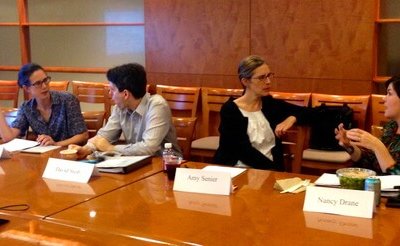Pro Bono Week Wrap-Up: Poverty Law Conference
By Cheryl Polydor According to the latest figures published by the US Census Bureau, approximately 46.2 million Americans live in poverty - that's 15 percent of the population. The numbers are worse for our children: 22 per cent of all American children live in households with incomes below the official poverty line. African American and Latino children are hit the hardest: 42.5 percent of African American children, and 37.1 percent of Latino children are living in poverty. Poverty - and the tools to effectively represent people living in poverty - was the focus of the Poverty Law Conference last weekend at American University's Washington College of Law. Organizers Ezra Rosser, professor at the Washington College of Law, and Marie Fallinger, professor at Hamline School of Law, were joined by a group of scholars and activists who discussed the legal policy strategies to help poor people achieve economic justice. Almost 200 people attended. The conference featured two powerhouse presentations, one by a lawyer and one by a sociologist. The opening speaker was lawyer and activist Peter Edelman, one of the foremost experts on poverty in the United States. Edelman currently teaches at Georgetown Law and serves as faculty director of Georgetown's Center on Poverty, Inequality and Public Policy. Early in his career, Edelman served as a legislative aide to Senator Robert Kennedy. Edelman drew on his forty-plus years of activism and public service to present a thoughtful analysis of poverty and its causes. Among them: the prevalence of low-wage jobs, the growth of single-parent households, the shrinking safety net, and persistent structural discrimination based on race and gender. The solution? Jobs. Jobs that pay a living wage. Harvard sociologist William Julius Wilson was the keynote speaker at Friday's lunchtime plenary session. A former MacArthur Fellow, Wilson is currently one of only twenty University Professors, the highest distinction for Harvard faculty members. Wilson described the historical and structural factors behind the current poverty statistics. He pointed to the historic "clustering" of black and Latino men in disappearing manufacturing jobs and low-paying service jobs. He identified the institutional failures of urban schools and community colleges, which do not effectively prepare minority students for gainful employment in the new economy. And he explained the "neighborhood effect": poor urban neighborhoods increasingly offer few job opportunities and lack basic services and amenities, such as banks, retail establishments, and quality transit. Wilson, like fellow activist and scholar Edelman, believes that the way to win the fight against poverty is a comprehensive and sustained strategy of job creation. Washington, are you listening?







